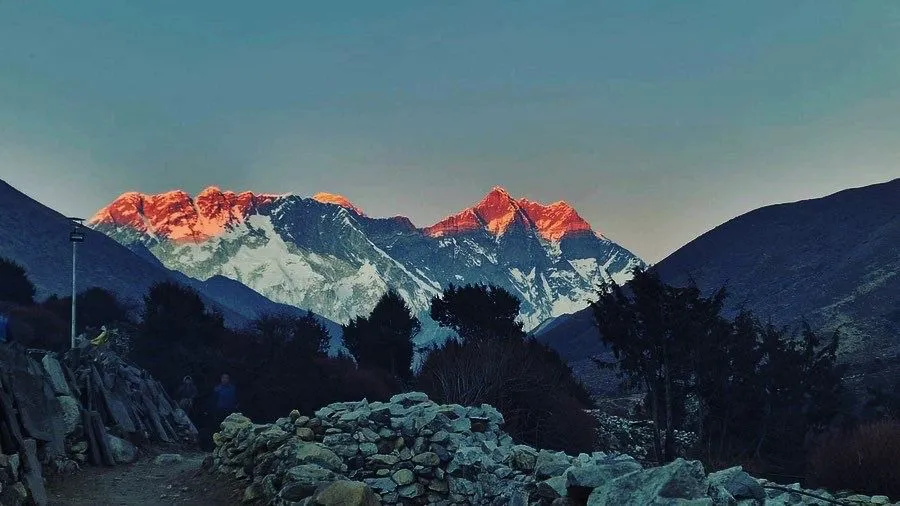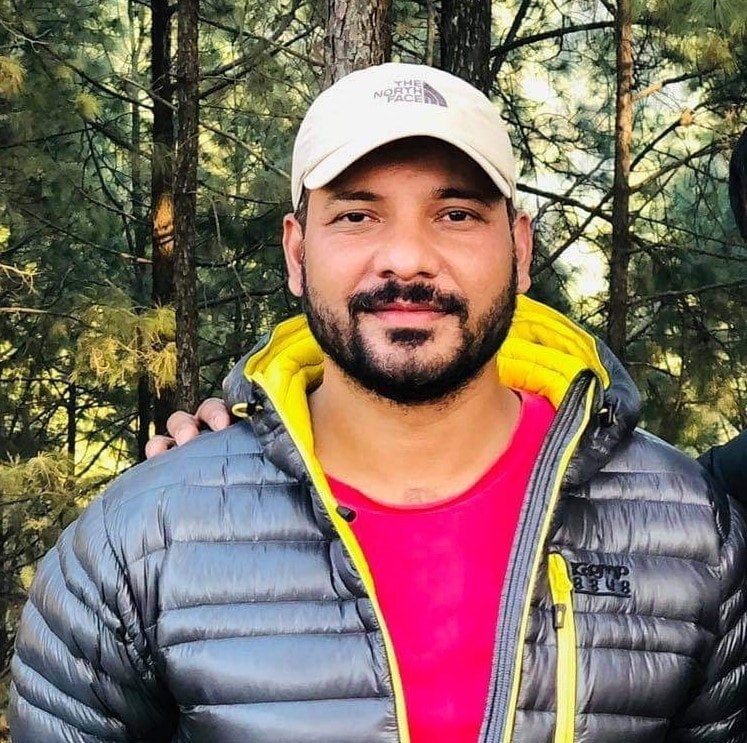You will cover the destination from Kathmandu to Everest Base Camp within 8 days from Kathmandu. Kathmandu also known as the Capital City of Nepal, where most of the trekkers will be arriving at Tribhuwan International Airport. The journey to Everest from Kathmandu is a challenging trek by overcoming the high passes and glaciers. Basecamp is situated at the highest elevation in the world, which itself is a trekking challenge.
Table of Contents
There are various ways & methods to reach the base camp of Everest from Kathmandu. You can reach there through domestic flights – trek, driving – trek, 1 Day Heli Tour, and more.
Distance To Mount Everest from Kathmandu
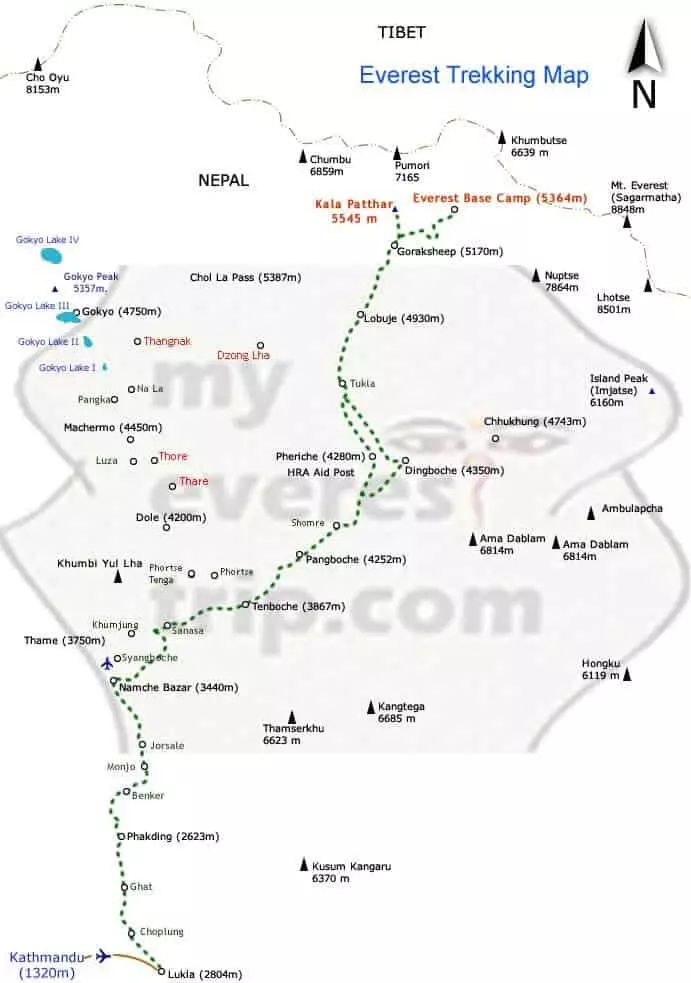
The distance from Kathmandu to Mount Everest is 205 km. The distance from Kathmandu to Mount Everest is 205 km.
You can divide this distance into two parts. The first part is the distance from Kathmandu to Lukla. You can cover this part by flying or driving.
The second part is the distance from Lukla to Everest Base Camp. This part requires trekking.
Fly / Drive Distance from Kathmandu to Lukla
The Flying Distance from Tribhuwan International Airport to Lukla Tenzing Hillary Airport is about 138 km of aerial distance. The flight takes 30 minutes to reach Lukla Airport which is the gateway towards Everest region trekking. Whereas sometimes due to weather conditions, trekkers prefer to drive from Kathmandu to Lukla which takes around 8 hours of driving.
8 Days Trek Distance to Everest Base Camp
The distance from Lukla to Everest Base Camp is 65km. During two days of acclimatization, we will trek to another place, making our total trek distance 80km. The average trekking hour to reach Everest is 5 hours per day.
The 8-day trek includes 2 days for acclimatization. We spend one day in Namche Bazzar on Day 3, and we spend another day in Dingboche on Day 6.
Itinerary to Everest From Kathmandu
| Itinerary | Distance (K.m) | Trek Hours |
| Fly to Lukla and Trek to Phakding | 138 + 8 km | 3 Hours |
| Phakding to Namche Bazaar | 12 km | 6 Hours |
| Acclimatization Day – Hike to Everest View Hotel | 4 km | 4 Hours |
| Namche to Tengboche | 11 km | 5 Hours |
| Tengboche to Dingboche | 12 km | 5 Hours |
| Acclimatization Day- Hike to Nagarjun hill and Return | 6 km | 4 Hours |
| Dingboche to Lobuche | 12 km | 5 Hours |
| Lobuche to Gorakshep – Everest Base Camp – Return | 15 km | 8 Hours |
| Gorakshep – Kala Patthar | 14 km | 7 Hours |
| Pheriche to Namche | 15 km | 7 Hours |
| Namche to Lukla | 20 km | 8 hours |
| Flight from Lukla to Kathmandu | 138 km | 35 Minutes |
The 12-day Everest Base Camp trip starts with a 30-minute flight to Lukla. After that, there is a 3-hour trek to Phakding on Day 1.
On the following day, you will visit Namche Bazaar and have the opportunity to explore the surrounding area. The distance between Phakding and Namche Bazaar is 12km.
On the next day, you will go to Namche Bazaar and explore the area. The trek from Phakding to Namche Bazaar is 12km. The next day, you will stay at the same place to get used to the altitude.
Then, you will go to the highest hotel in the world, Everest View Hotel, and enjoy looking at the pictures. Namche even earns a reputation as the commercial hub of the Everest region.
On Day 4, you’ll head towards the Tengboche situated at 3860m. Interesting fact: Tengboche Monastery is the highest monastery in this entire region. The Distance from Namche to Tengboche is 11 km which takes us 5 hours to reach there.
Next Day, you’ll trek to Dingboche. The height from Tengboche to Dingboche is 3,860m to 4,410m. This change in altitude can lead to altitude sickness, so there will be a day for acclimatization.
On Day 7, our destination will be the Lobuche which covers 12km distance in 5 hours. On the Day 8 you’ll reach Everest Base Camp from Kathmandu by trekking via Gorakshep after lobuche.
You have two options for returning. The first option is to go back the same way you came, through Gorakshep – Kala Patthar, Pheriche to Namche. Then, you can take a flight from Lukla the next day. The second option is to take a flight back to Kathmandu on Day 9. Alternatively, on Day 9, you can take a flight back to Kathmandu.
Recommended Everest Packages
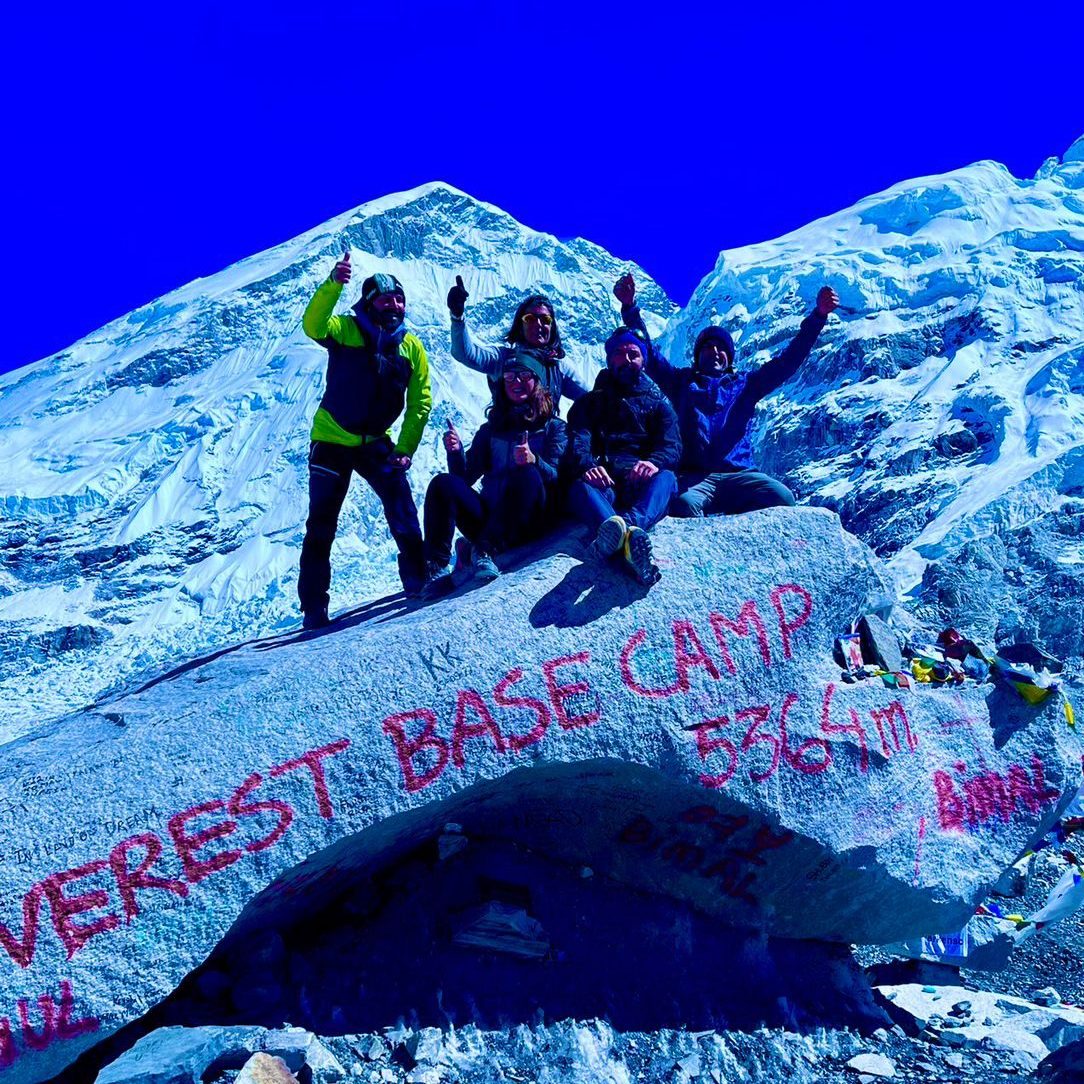
12 Days Everest Base Camp Trek Itinerary and Cost For 2024
Everest Base Camp Trek: Adventure and trekking to Everest Base Camp (5364 m) in Nepal. Cost-effective trek to EBC, 12 Days Base Camp Trek. Book now.
Enquire Now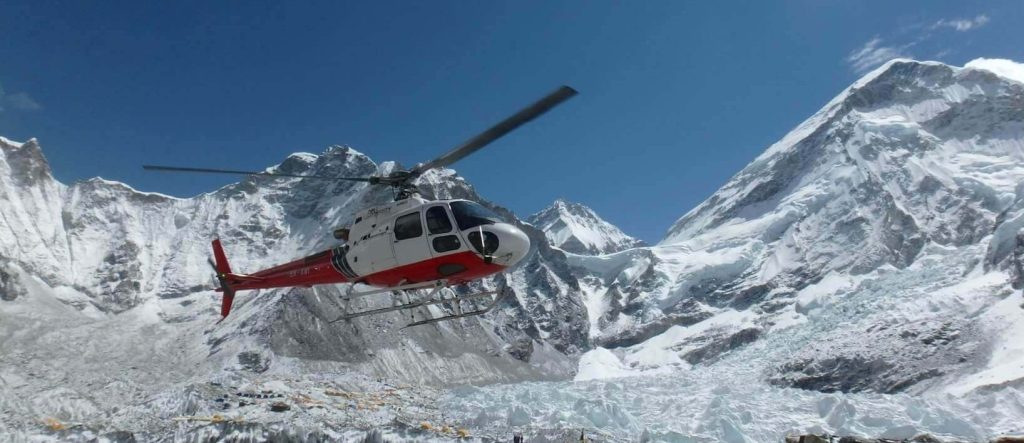
Everest Base Camp Helicopter Tour
Do you dream of seeing Everest but do not quite fancy spending a few weeks hiking there? Well, don’t worry – we have the solution for you. We can take you to Everest in just one day – all in the comfort and thrill of a Helicopter!
Enquire Now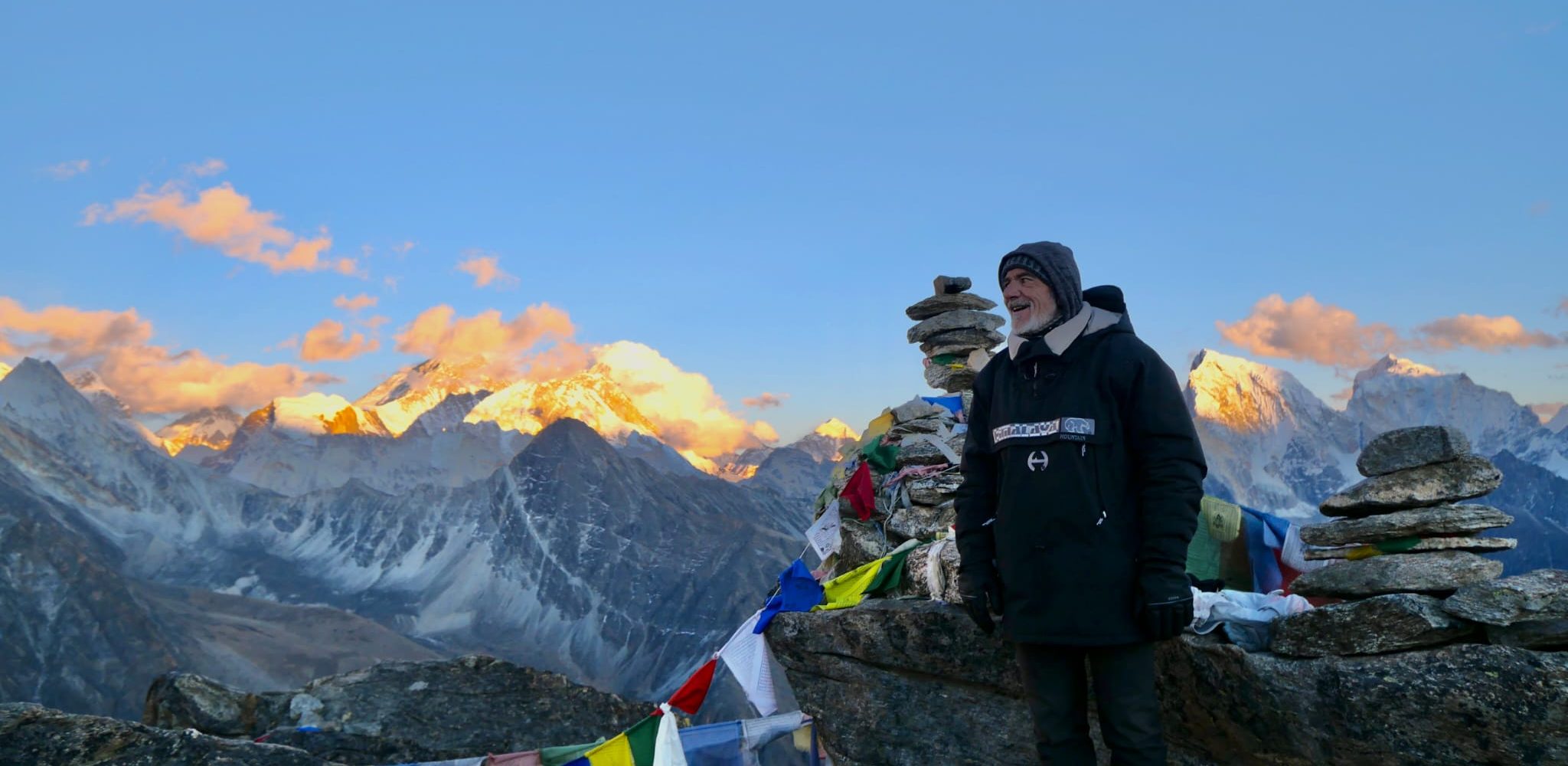
Everest Gokyo Ri Trek
Everest Gokyo Ri Trek across Gokyo village. It offers adventure and a view of Everest, lakes, glaciers, and the Himalayas. Everest Gokyo Ri Trek, Everest Trekking Packages.
Enquire NowAccommodation Depends Upon Cost of Everest Base Camp Package
The accommodation in the trip depends upon the type of Everest Base Camp Trek Cost you choose. There are three types of packages: Budget, Standard, and Luxury trek. You can find twin bed accommodation in a room with normal furniture & design, whereas in a luxury hotel, you can get better finishing of home and decoration.
Other amenities are,
- The Hotel Shower: 2-4$ depending upon altitude.
- Charging Phones will cost you 2-3$ /-hour
- Ncell Sims with 3G Data is available.
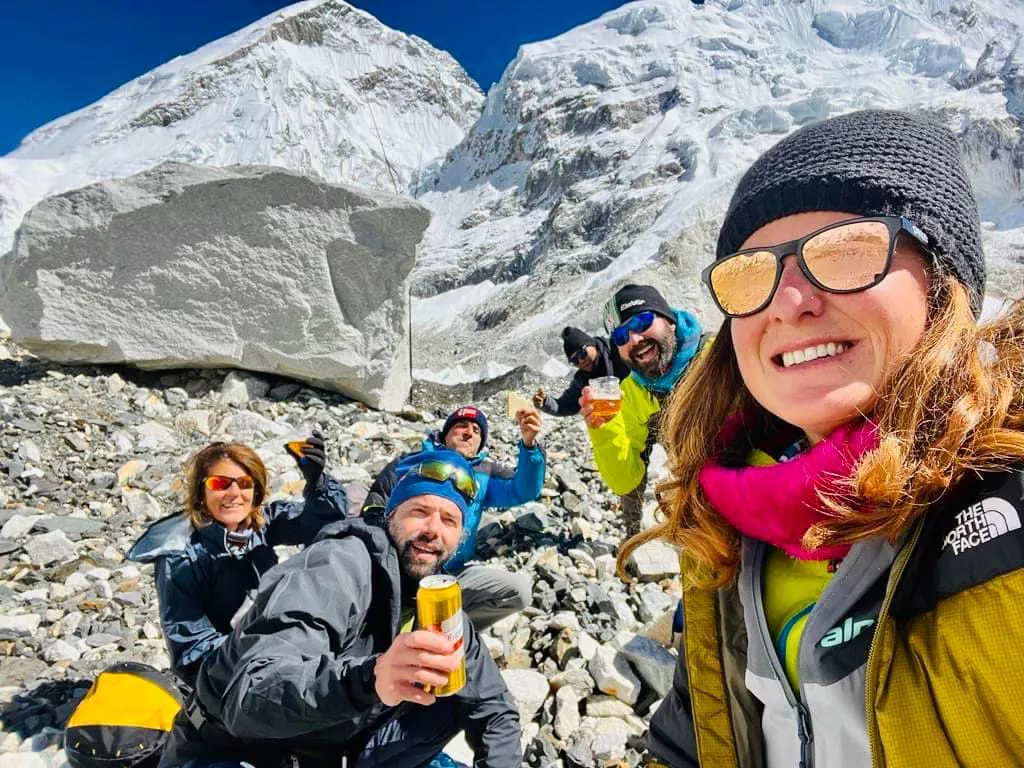

Everest Base Camp Helicopter Tour
Do you dream of seeing Everest but do not quite fancy spending a few weeks hiking there? Well, don’t worry – we have the solution for you. We can take you to Everest in just one day – all in the comfort and thrill of a Helicopter!
Enquire Now
Incredible Everest Short Trek
Everest Short Trek to explore the Everest region. Who wants an easier way to experience Mount Everest trekking in the Everest region in a short space.
Enquire Now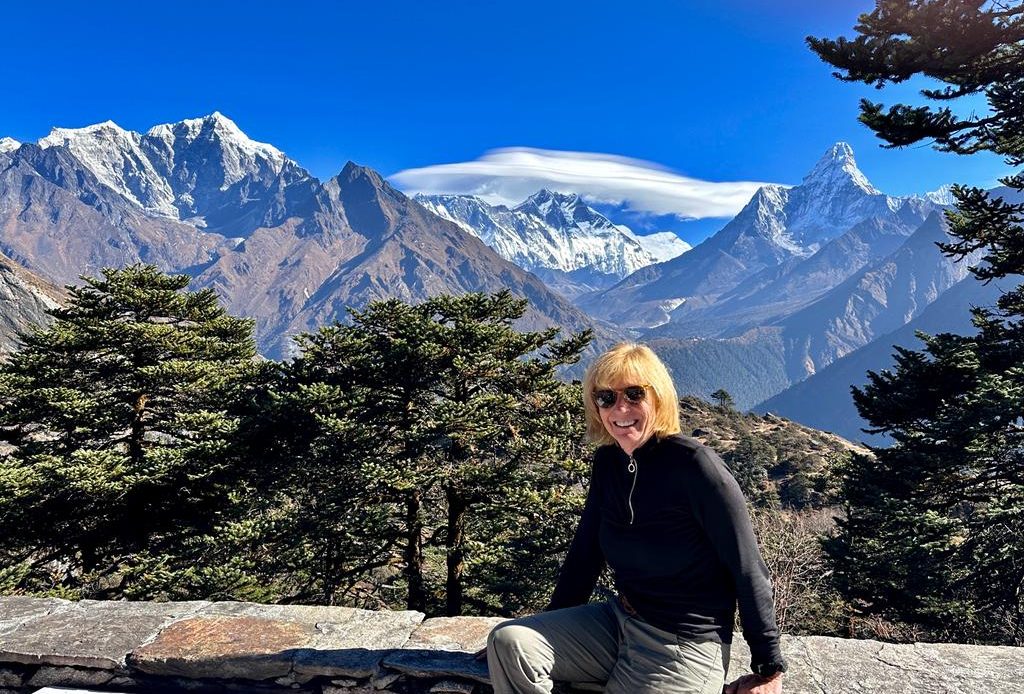
Luxury Everest Base Camp Trek
Luxury Everest Base Camp Trek presents adventure and comfort in the Himalayas. It’s a dream adventure for many outdoor enthusiasts, offering a unique opportunity to…
Enquire Now
12 Days Everest Base Camp Trek Itinerary and Cost For 2024
Everest Base Camp Trek: Adventure and trekking to Everest Base Camp (5364 m) in Nepal. Cost-effective trek to EBC, 12 Days Base Camp Trek. Book now.
Enquire NowEquipment Checklist for Kathmandu to Everest Base Camp Trek
This checklist will assist you in packing the essential items for the Kathmandu to Everest Base Camp trek. It will ensure that you have a successful and enjoyable experience.
1. Clothing and Footwear:
- Base layer (moisture-wicking shirts and pants)
- Insulating layers (fleece or down jackets)
- The waterproof and windproof outer shell
- Trekking pants and shorts
- Thermal socks and hiking socks
- Sturdy trekking boots
- Hat and gloves for warmth
- Sunglasses with UV protection
2. Backpack:
- Comfortable and adjustable backpack with a rain cover
- Trekking poles for stability and support
- Headlamp with extra batteries
- Lightweight and quick-drying towels
- Travel-sized toiletries
- Multi-purpose knife or tool
- Whistle for emergencies
- Duct tape (for repairs and blister prevention)
3. Sleeping Gear:
- Warm and lightweight sleeping bag (rated for sub-zero temperatures)
- Sleeping pad or inflatable mattress for insulation and comfort
4. Hydration and Water Purification:
- Water bottles or hydration bladder
- Water purification tablets for safe drinking water
5. First Aid Kit and Medications:
- Comprehensive first aid kit including bandages, antiseptic ointment, and blister treatment
- Prescription medications
- Over-the-counter pain relievers and altitude sickness medication (under medical supervision)
6. Navigation and Communication:
- Detailed trekking map or guidebook
- Compass or GPS device for navigation
- Mobile phone with a local SIM card and power bank
- Emergency contact numbers and important addresses
7. Miscellaneous Items:
- Sunscreen with a high SPF rating
- Lip balm with UV protection
- Insect repellent
- Lightweight and quick-drying clothing for rest days
- Trekking permits and identification documents
- Cash in small denominations for tea houses and purchases along the way
Best Season for Kathmandu to Everest Base Camp:
Spring is the best time for the Everest Base Camp trek. It has good weather, beautiful scenery, and rich cultural experiences.
The stable weather conditions provide a more enjoyable trekking experience compared to other seasons. The crystal-clear skies offer uninterrupted panoramic views of the majestic Himalayan peaks, including Mount Everest. The vibrant colors of rhododendron flowers create an enchanting atmosphere during the journey.
Spring Season
In spring, you can go trekking and see lively festivals like the Sherpa festival called “Saga Dawa.” It celebrates the birth, enlightenment, and death of Gautama Buddha, and you can join in the celebrations. Witnessing these cultural ceremonies and traditional dances provides a deeper insight into the local Sherpa culture and spiritual beliefs.
Picking the best time for the Everest Base Camp trek is important. Spring gives an amazing experience in the Himalayas.
Autumn Season
Autumn is the ideal season for trekking to Everest Base Camp in Nepal due to its pleasant and stable weather. The days are usually bright and pleasant, with low elevation average temperatures ranging from 10°C to 20°C. Trekkers can fully experience the breathtaking scenery of the Everest region because of the weather’s bright sky and superb visibility.
The golden hues of autumn foliage enhance the scenic beauty of the region. The monsoon rains have subsided, reducing the risk of landslides and slippery trails. The trails are relatively dry, allowing for safer and more enjoyable trekking experiences.
Autumn is also a vibrant time, filled with colorful festivals and cultural celebrations, such as Dashain.
Compared to peak trekking seasons, autumn offers a less crowded experience, with quieter trails and better availability of teahouses and accommodations. Autumn is a safe time for trekking on Everest. The weather is stable, the trails are good, and there are experienced guides and porters.
Height of Mt Everest: Everest Base Camp Height Change
Mount Everest’s height can change over time due to reasons like plate movements, melting snow and ice, and other factors. It is not a fixed measurement.
Mount Everest’s height was previously 8848 meters (29,029 feet). However, recent measurements by technicians have revised it to 8,849 meters (29,032 feet). This change reflects the continuous advancements in scientific understanding and measurement accuracy.
Why is Everest Base Camp the Best Trekking Destination?
- Spectacular Scenery and Panoramic Views
- Mount Everest is the Roof of the World
- Sagarmatha is the UNESCO world heritage site
- Trekking Through Rich Sherpa Culture and Hospitality
- Challenging Yet Rewarding Experience
- Breathtaking Views from Kala Patthar
- Accomplishing a Personal Achievement
- The Unique Flora and Fauna of the Everest Region
- Well-established Trekking Infrastructure
Conclusion:
Trekking from Kathmandu to Everest Base Camp is an unforgettable experience, taking trekkers through diverse landscapes, rich cultural heritage, and breathtaking vistas. The distance and route from Kathmandu to Everest Base Camp offer a challenging yet rewarding adventure. Reaching Everest Base Camp, whether through the usual way or different routes, is a remarkable accomplishment and a personal victory.



